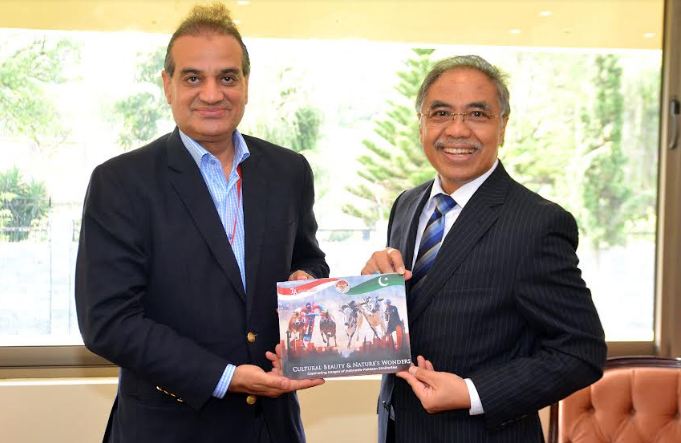Ambassador of Indonesia Adam Tugio says ASEAN-Pakistan collaboration has the potential to bring tremendous benefits for both sides; keen to enhance think-tank cooperation; ASEAN study centres being established in various institituions
Ansar Mahmood Bhatti
ISLAMABAD: Ambassador of Indonesia to Pakistan Adam Tugio gave an exclusive interview to Daily Islamabad POST. Ambassador Tugio talked about a variety of subject relating to bilateral as well multilateral issues. He specifically talked about trade and economic cooperation between the two countries and shared his vision as to how this cooperation can further be strengthened. Here is the text of the interview.

- Indonesia is celebrating its 76th IndependenceDay on 17 August 2021. Please share with our readers the significance of the Day and how do you plan to celebrate the event amidst prevailing Covid situation?
For every sovereign nation, Independence Day is a source of pride and a symbol of national unity. The 17th of August is a day of great significant for Indonesians because we honor their founding fathers’ sacrifices for independence while also reaffirming our resolve to work hard in pursuit of wealth, peace, and progress. This important day also gives an opportunity to celebrate national accomplishments and consider future plans of action.
Today, Indonesia is a vibrant democracy as well as a diverse and pluralistic society. We cherish the values of freedom and tolerance based on the principles of unity and diversity. As the largest economy in Southeast Asia, under the leadership of Indonesian President Joko Widodo,Indonesia has shown steady economic growth even in this turbulent pandemic time and has made significant social progress.
The Independence Day is traditionally celebrated across Indonesia with great enthusiasm. From the presidential palace to remote villages, the festivities include flag hoisting ceremonies, parades, competitions and cultural performances that reflect the national identity. However, the pandemic situation has certainly affected the routine life activities and big gatherings on this occasion would probably be difficult. But, the spirit to celebrate is high as people are emotionally charged to reflect their association and love with their homeland. So, the celebration may be held virtually or at the limited scale this year but it would certainly not affect the vigor and sense of pride of the Indonesian people.

- Covid has hit Indonesia hard like other countries. If you could briefly dilate upon the negative effects of the pandemic on the Indonesia economy and Government’s measures to cope with this predicament?
The global economy has been devastated by the COVID-19 pandemic. Small companies and the tourism sector have been hit hard by this pandemic.The impact of a pandemic is not confined to Indonesia. Following Eid Al-Adha, we have noticed an increase in the positive ratio. Around 25% of population have received inoculation as of August 1, but we observe that the virus is evolving. To prevent the virus from spreading, the Indonesian government has implemented social restrictions in areas where the number of cases is high, which are reviewed on a daily basis to allow responsible economic activity to resume once the health situation has been stabilised.
The Indonesian government has set comprehensive COVID-19 policies. The National Economic Recovery Programs (NERP) offers a stimulus of up to IDR 700 trillion or USD 48 billion last year and almost the same amount for 2021. The stimulus will be used to support public healthcare, enhance social safety nets, and provide incentives to MSME’s and business sector.

The health sector receives the largest allocation of USD 15 billion, followed by social protection with a total budget of USD 13 billion, MSMEs stimulus of USD 11 billion, and business incentive of USD 4,4 billion.After contracting to -5,32 last year, the economy is rebounding in the first semester of 2021, achieving its highest annual growth rate in 17 years. The expansion rate surpassed experts’ expectations of 6.57 percent and was the best since the October-December quarter of 2004. The economy was bolstered by soaring exports, notably a 56 percent increase in commodities shipments, a resurgence in consumption and investment, and increased government expenditure.
- Pakistan wants expansion and deepening of relations with especially the ASEAN countries. Do you think Pakistan’s “Look East” policy can pay dividends?
I fervently believe that active ASEAN-Pakistan collaboration has the potential to bring tremendous benefits for both sides. The ASEAN countries deeply appreciate “The Look East “policy of Pakistan and its strong desire tofurther expand the mutually beneficial cooperation. In the wake of ongoing geo-economic scenario, the importance of comprehensive ASEAN-Pakistan relations has also been increased significantly. The fast growing economy of the Asia Pacific region, which is the future hub of the world trade, offers a precious opportunity for cooperation and development. The Southeast Asian region is projected as centre of global trade activities with its combined population of over 649 million and a GDP exceeding USD 2.9 trillion or the fifth largest economy in the world. Moreover, Indonesia alone is a trillion dollars economy as well as the biggest economy in this region, which reflects the pattern of global trade trend towards this area.
Likewise, China-Pakistan Economic Corridor (CPEC), BRI initiative, Gwadar port are projects of immense importance in South Asia for the potential two-way investments. ASEAN has already gained substantive economic benefits from regional cooperation and peaceful conflict resolution strategies. Therefore, as ASEAN’s Sectoral Dialogue Partner, Pakistan could strengthen ties with ASEAN in the field of scientific research, education, IT, agriculture and through high-level interaction and connectivity with Pakistani diaspora living in Southeast Asia, which will certainly cement the bonds of friendship.
- In the recent days, the Indonesian Embassy partnered with various think-tanks and organized webinars and conferences on Pakistan-ASEAN relations? How do you assess this activity? Besides,as the incumbent rotating chairof ASEAN Committee in Islamabad, what else do you have in mind to promote this relationship?
In fact, during my six-month tenure as Chairman of Asean Islamabad Committee (ACI), I have tried to enhance engagement with the think-tanks of Pakistan to create more awareness about ASEAN and to further explore the possibilities of enhanced collaboration. The Indonesian Embassy has arranged several events in collaboration with think tanks like ISSI and CGSS, online courses, webinars with Vice Chancellors of Universities in Pakistan, especially to highlight the available opportunities and expand cooperation. I am glad that we have been successful in attracting the students through our efforts and there is renewed interest to know more about Southeast Asia among the Pakistani students.
To further enhance the people-to-people contacts, the Embassy has also been working to promote the establishment of ASEAN Study Centre and Indonesian Corners at some leading Pakistani universities for the benefit of students and book lovers to learn more about ASEAN and Indonesian literature, culture and other topics of interest. The Embassy is also in the process of publishing a “Coffee Table Book” that highlights the striking similarities in our geographically distant apart countries.
- During past few years, we have witnessed enhanced economic activity between Indonesia and Pakistan. Are you satisfied with existing trade and economic cooperation or you think still more needs to be done?
We have certainly seen a healthy trend in economic activities between Indonesia and Pakistan during the last decade but still it does not reflect the true trade potential. Since there is always a room at the top, therefore, existing bilateral trade level could go much higher as vowed by the top leadership of the two countries. Indonesia and Pakistan with their combined population of almost half billion are the two emerging economies of young and talented people which make the prospects of bilateral investment and economic cooperation very bright.
Meanwhile, the Covid-19 pandemic is another hurdle, which is hampering the pace of trade activities. We are not sure when it will end, therefore, the Embassy is utilising digital information technology tools to implement the new normal strategy and to develop linkages between the Chambers of Commerce & Industry of both sides. The strategy aims to ensure flow of information on business opportunities throughvirtual multi business meetings, virtual Trade Expo and introduce new investment plans. Another attractive opportunity for Indonesian trade sector is the ongoing CPEC project in Pakistan, which could serve as a prospective hub to increase Indonesia’s trade andinvestment in south and central Asia. Several supporting factors, such as increasingly stablesecurity conditions, pro-investor policies, a large population, big consumer market and talented millennial have also made Pakistan a promising investment destination for Indonesia. I trust that the real trade potential of our corporate sector is far above than the trade figures and what we need is more concerted efforts to materialize this potential.
- Other messages you want to convey to the readers?
What a pleasant coincidence that our Pakistani brothers and sisters, like Indonesian, also commemorate their Independence Day in August. Let me take this opportunity, therefore, to extend my heartiest felicitations to the Government and the brotherly people of Pakistan on the auspicious occasion of the 74thAnniversary of Independence of Pakistan. At this time of jubilation, I wish to pay tribute Pakistani brothers and sisters for making significant socio-economic progress. Pakistan is a lovely country of talented people and big potential. I am very glad that Indonesia-Pakistan ties are accelerating and consolidating with a fast pace in all important areas of bilateral interest. May the wonderful cordial relations and spirit of cooperation between our two countries continue to develop for the mutual benefit of our two countries and peoples.











